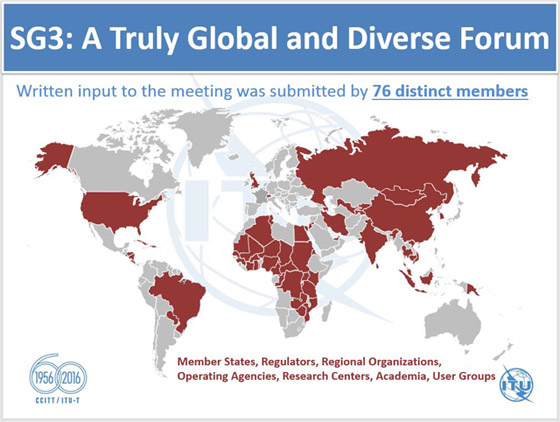Archived Newsroom • Press Release |
|
ITU strengthens ties between technology, business and
policy
Economic and policy requirements to play a greater role in informing ITU
standardization
Geneva, 9 March 2016 – The international community is
looking to ITU’s unique public-private partnership of members for a neutral
platform to strengthen the ties between technical innovation, business needs and
economic and policy requirements.
ITU has intensified its efforts to ensure congruent technical innovation and
policy development, addressing concerns that technology too often races ahead of
policy, with the result that governance frameworks fall out of step with market
realities. Challenges to fair market competition may arise as a result, and
legislation may no longer afford adequate protection to consumers.
Growing interest among ITU members in building greater cohesion in the
progression of technology and policy is very evident in the work of
ITU-T
Study Group 3, ITU’s standardization expert group responsible for
economic and policy issues relevant to international telecommunications.
“It is encouraging to see developing countries playing a central role in the
work of ITU-T Study Group 3,” said ITU Secretary-General Houlin Zhao. “The group
is demonstrating great leadership in narrowing the historical divide between
developed and developing countries’ participation in international
standardization and related debates around policy, economics and tariffs.”
“ITU-T Study Group 3 is strengthening the ties between ITU’s economic and
policy deliberations and its technical standardization activity,” said Seiichi
Tsugawa, Chairman of ITU-T Study Group 3. “We are innovating to provide ITU’s
standardization expert groups with economic and policy baselines to be
considered in the development of new technical standards.”
“ITU’s technical standardization work is predominantly industry-driven, with
business requirements forming the main fuel to standardization,” said Chaesub
Lee, Director of the ITU Telecommunication Standardization Bureau. “ITU-T Study
Group 3 is taking action in response to the perception among ITU members that
the alignment of technology, business and policy will see significant
improvement if technical standardization grants equal weight to technical
innovation, business needs and policy requirements.”

The recent meeting of ITU-T Study Group 3 held in Geneva, 22 February to 1
March, hosted a diverse selection of participants, representing governments and
their regulators, private-sector players, user groups and academic and research
institutes. Contributions to the meeting were received from over 60 countries.
ITU Study Group 3 is broadening its debate around over-the-top (OTT)
communications with a view to developing international standards on OTT
messaging, telephony and streaming services. Discussions on the topic explored
the promotion of OTT innovation, possible regulatory approaches to OTT, the
value of partnerships between OTT players and mobile network operators, as well
as incentives for infrastructure investment and the protection of privacy and
personal data.
The group has also accelerated its study of mobile financial services (MFS),
the ‘mobile money’ innovations capitalizing on the ubiquity of mobile phones to
deliver formal financial services to the world’s poorest people. International
standards are beginning to appear on the horizon as ITU-T Study Group 3 works to
empower consumers and encourage a level playing field for MFS competition and
market entry in close collaboration with the
ITU-T Focus Group on Digital Financial Services.
The recent meeting of ITU-T Study Group 3 achieved first-stage approval of
five international standards:
- ITU-T D.52 “Establishing and connecting regional Internet
Exchange Points (IXPs) to reduce costs of international Internet
connectivity” will guide regional collaboration to establish
central hubs (IXPs) that enable local Internet traffic to be
routed locally, saving international bandwidth and reducing the
costs of international Internet connectivity.
- ITU-T D.53 “International aspects of Universal Service”
offers guidelines to increase compliance with Universal Service
policies as well as the extent to which they achieve their goal
of delivering a minimum level of ICT services to every
inhabitant of a country.
- The revised ITU-T D.271 “Charging and accounting principles
for Next-Generation Network (NGN)” sets out the general
principles and conditions applicable to the use of packet-based
networks to transport packets between standards-based interfaces
and the services that they support.
- ITU-T D.97 “Methodological principles for determining
international mobile roaming rates” proposes a possible approach
to the reduction of excessive roaming rates, highlighting the
need to encourage competition in the roaming market, educate
consumers and consider appropriate regulatory actions such as
the introduction of caps on roaming rates.
- ITU-T D.261 “Principles for market definition and
identification of operators with significant market power”
proposes principles and guidelines to assist countries in
defining and identifying significant market power and assess
whether or not, and the degree to which, this power has been
abused by international telecommunications companies.
The meeting also reached agreement on the launch of large volume of new work,
including:
- Quantifying cross-border market power in telecommunications
- Impact of dynamic tariffing on market competitiveness
- Partnerships between OTT players and mobile network
operators
- Guidelines for digital identity
- Guidelines for MFS Agents
- Guidelines for e-money issuers
- Infrastructure sharing
- Roaming for the Internet of Things and M2M
(Machine-to-Machine) communications
For more information, please see ITU-T Study Group 3
homepage or contact:
Sanjay Acharya
Chief, Media Relations and Public Information, ITU
|
|
|
About ITU...